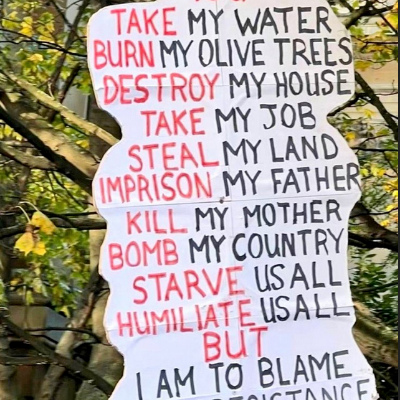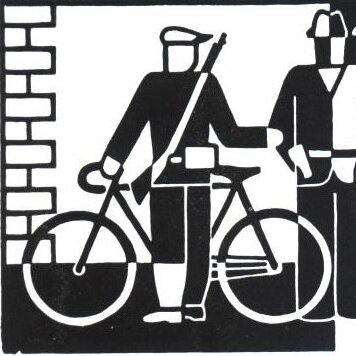The Hundred Years’ War on Palestine
A History of Settler Colonial Conquest and Resistance, 1917-2017 by Rashid Khalidi
A landmark history of one hundred years of war waged against the Palestinians from the foremost US historian of the Middle East, told through pivotal events and family history.
@appassionato @bookstodon @palestine
When the title and subtitle are so politically-skewed, I can’t imagine this book would give an objective overview of this complex and bloody conflict.@[email protected] @[email protected] @[email protected] @[email protected]
@palestine
Balance is in short supply, #ZionistSettler advocacy machine prohibits it
A derogatory mention of #Israel results in torrents of conflation equating criticism w antisemitism, it isn’t
The solution is not complex, it’s very simple, time
In time the #IsraeliSettlerProject will fail
western support dwindles
millennial+ support is zero
demographic supporting #zionistsettler projects is dying off
In 30/40 yrs time #israel will cease to exist@[email protected] @[email protected] @[email protected] @[email protected]
That’s one possible scenario, which stems from very certain debatable assumptions.
The problem with predicting the future is with the unknowns and the impact of seemingly inconsequential elements on the course of history. For example, the climate crisis will likely change the geopolitical situation in the middle east immeasurably. How would Israel cope? Hard to say decades in advance. It might emerge stronger, or take a hit.
@[email protected] @[email protected] @[email protected] @[email protected] they’re not skewed. the “conflict” isn’t complex.
@[email protected] @[email protected] @[email protected] @[email protected]
If that were true, it would have been resolved decades ago, one way or another.
But if you somehow have a new insight that explains the current quagmire both sides have dug themselves into, or you have some simple solution - I’m all ears. Don’t be shy.
@ymishory @appassionato @bookstodon @palestine it could have been, but the State of Israel blocked that on more than one occasion, even as early as 1948. It’s simple. The occupation must end, Israel as a Jewish state must cease to exist. A right of return for Palestinians and substantial reparations for loss of property and life. And I’m looking forward to a country, between the river and the sea, in which ALL citizens have full rights. May it happen speedily and in our days, amen
@[email protected] @[email protected] @[email protected] @[email protected]
Your first sentence - I’m not sure I understand exactly what you mean there. What has Israel blocked and how? What was the situation before 1948? Please clarify.
As for your suggested solution, can you elaborate on what needs to happen to bring about this utopia?
@[email protected] @[email protected] @[email protected] @[email protected] The genociding needs to stop. That’s perhaps the easiest to accomplish right now. A ceasefire. Not a “pause”. A ceasefire. And Israel needs to loose its “Europeanness”. Because that’s what zionism ultimately is. The project to make Jews into Europeans. Unfortunately the core European values is genocide.
@[email protected] @[email protected] @[email protected] @[email protected]
Needs to, has to, must… Those are slogans. Let’s get real.
The war in Gaza will probably end in a ceasefire that will not last. Where do we go from there? How do we break the cycle of bilateral violence?
If that ever happens, who should lead the Palestinians and what should they do to promote an independent and self-reliant Palestine?
@[email protected] @[email protected] @[email protected] @[email protected] Do you for one moment think that things can go on like this inside Israel, for Israel? It’s unsustainable. Let go or be dragged. I look at Israel and I see a deranged and genocidal nation.
@ymishory @anantagd @appassionato @bookstodon @palestine There is no single answer. Probably the only viable solution is a single, multi-ethnic secular state. While I would prefer all the Zionists to be expelled, this is unlikely to happen, and we will just have to wait until all the European “Israelis” leave & return to Europe/US etc. I expect many will, just as the majority of racist South Africans left after disposing of that colonial state.
@[email protected] @[email protected] @[email protected] @[email protected] no és un conflicte tan complex com per entendre l’objectiu sionista, els seus mètodes i qui el recolza. Amb molt poc esforç i des de l’honestedat estic segur que tu també podràs entendre-ho. No sé pas, en canvi, si ho podràs reconèixer públicament.
@[email protected] @[email protected] @[email protected] @[email protected]
The conflict is long, multi-faceted, emotional, and very complex. Anyone who suggests it is simple to understand, let alone solve, either doesn’t know enough about history and the current geopolitical setup, or is trying to sell something.
Unfortunately, an honest examination of facts will get you nowhere in today’s culture of inch-deep discussions 😞
@[email protected] @[email protected] @[email protected] @[email protected] per més que hi intervinguin multiplicitat de factors i agents, precissament perquè tenim molts exemples històrics, en essència, no costa entendre amb facilitat que està passant a #Palestina: un procés de colonització concebut a Europa i promogut des d’#Occident pretenent resoldre un problema europeu, de blancs supremacistes, desplaçanr-lo a un indret on habiten persones que no hi tenen cap responsabilitat.
@[email protected] @[email protected] @[email protected] @[email protected]
I’m using Google Translate to read your text, so I apologize for any miscommunication.
This conflict is territorial, religious, cultural and ethnic. To diminish the Zionist side of it to colonialism is a disservice to history, and ignores the history of antisemitism and nationalistic trends in 19th century in Europe, which influenced prominent Jewish leaders of the time.
This is just an example of the simplification I mentioned earlier.
@ymishory @appassionato @bookstodon @palestine [jo també utilitzo un traductor, hi ha força llengües al món més enllà de les hegemòniques (ergo: colonialistes)]
Per remarcar un detall de la teva aportació: els palestins són semites. No sé a què treu cap parlar d’antisemitisme pel què està succeint pròpiament a #Palestina.
Per cert, aviat no quedaran masses palestins, simplement per inanició, i no caldrà fer compendre al món tanta complexitat. Aviat serem més feliços, oi?
@[email protected] @[email protected] @[email protected] @[email protected]
In 19th century Europe, antisemitism manifested mainly in the persecution of Jews. If Arabs lived there, I’m sure they would’ve suffered the same fate as their Semite brothers.
AFAIK there were almost 2 million Israeli-Arabs and nearly 3 million Palestinians living in the west bank, so they’re not going anywhere soon.
Personally, it brings me no joy when another human suffers, and I pray that the endless violence will cease ASAP 🙏
@[email protected] @[email protected] @[email protected] @[email protected] jo només entendre la justícia si es restitueix #Palestina i és Palestina qui decideix com s’ha de viure a Palestina –a més de deixar d’assassinar, destruir i ocupar (són fets abastament repetits) amb tot d’excuses “complexes”–.
Ara no és moment dels jocs de màscares. Ja no.
@ymishory @appassionato @bookstodon @palestine The title is not skewed at all. The title and sub-titles are no more than a factual summary of the reality of Paslestine TBH.
@KarunaX @appassionato @bookstodon @palestine
The choice of phrases such as “War on Palestine” and “Settler Colonial Conquest” suggests to me a bias. All historians are biased, of course, but this seems somewhat excessive for academic objectivity.
Then again, I haven’t read the book. Mr. Khalidi might present a well-constructed and fact-supported narrative that justifies the strong phrases on the cover, in which case I will gladly admit my mistake.
@[email protected] @[email protected] @[email protected] @[email protected] @[email protected] When a description of reality sounds biased to you, the easiest explanation, and the most correct one, is that it’s your own bias the one that keeps you from engaging with reality.
@ymishory @appassionato @bookstodon @palestine Those phrases suggest to me a certain narrative, one based in an anti-colonialist perspective, similar to what we see with examinations of other settler-colonial societies (South Africa, Australia etc). And yes, I agree, all historians are telling a story from a certain position. Mr Khalidi’s academic credentials suggest that the content will be somewhat rigorous.
@[email protected] @[email protected] @[email protected] @[email protected] @[email protected] Isn’t an appeal to academic credentials an Argumentum ad populum logical fallacy and inherently classist?
@[email protected] @[email protected] @[email protected] @[email protected] @[email protected] @[email protected] What am I not getting here? Study at advanced academy isn’t trustworthy simply because a large number of people say so. If anything, that high education isn’t trustwortht has lately become a rather popular argumentum ad populum…
@[email protected] @[email protected] @[email protected] @[email protected] @[email protected] @[email protected] @[email protected] My point is they don’t address the actual arguement. They address the person making it. It’s also an appeal to accomplishment. By addressing the context and not the point the person is engaging in sophistry and not dialogue focused on understanding the truth. Logical fallacies are tools to understand when someone is hijacking our emotions
@[email protected] @[email protected] @[email protected] @[email protected] @[email protected] @[email protected] @[email protected]
It seems logical to me to expect solid work from someone known for producing solid work, and I see no fallacy here.@[email protected] @[email protected] @[email protected] @[email protected] @[email protected] @[email protected] Rubbish. Absolute rubbish. It seems you have been captured by a love for the rules of logic, but have (illogically) misapplied these.
@Kirilov @KarunaX @appassionato @bookstodon @palestine
From what Google says, Mr. Khalidi is an accomplished academic, and I have the utmost respect for his credentials.
As I wrote, the book may present a coherent and fact-based narrative that justifies the title and subtitle, but that would have to include some outstanding claims and evidence.
@ymishory @Kirilov @appassionato @bookstodon @palestine I think Khalid’s claims are not exceptional, but rather mainstream in academic (not populist) circles, given the numbers of other authors who propose a similar thesis. See eg Ilan Pappe, Schlomo Sand, Edward Said.
@[email protected] @[email protected] @[email protected] @[email protected] @[email protected] @[email protected] You mean Khalidi? Have you even read the text? Said is not a historian and Pappe does not come to the same conclusions.










